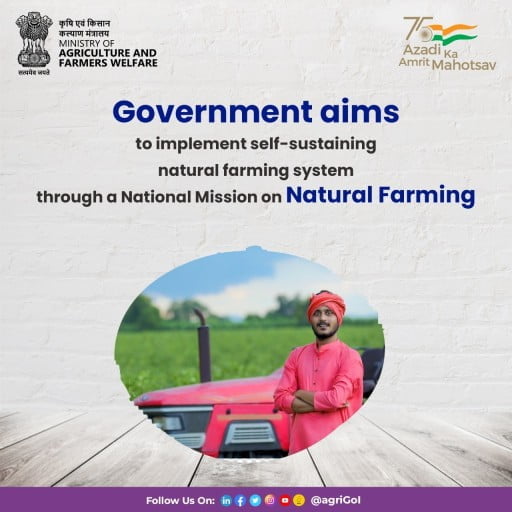National Mission on Natural Farming
About National Mission on Natural Farming
To promote natural farming throughout the country, the Bhartiya Prakritik Krishi Paddhati (BPKP) has been scaled up and formulated into the National Mission on Natural Farming (NMNF). The NMNF aims to cover a total area of 7.5 lakh hectares by developing 15,000 clusters. Interested farmers can register as cluster members and each cluster must consist of at least 50 farmers with a combined land area of 50 hectares or more. These clusters can be located in a single village or spread across 2-3 neighboring villages under the same gram panchayat.
Natural Farming and its significance
The method of natural farming relies on locally available resources and avoids the use of chemicals. It emphasizes traditional indigenous practices that allow farmers to avoid purchasing external inputs. The key focus of this method is on on-farm biomass recycling, including biomass mulching, the use of on-farm desi cow dung-urine formulation, and managing pests through diversity and on-farm botanical concoctions, while excluding all synthetic chemical inputs.
The significance of natural farming includes better health outcomes as it eliminates health risks associated with synthetic chemicals, while also offering food with higher nutritional density. Natural farming also aims to increase farmers’ income by reducing costs, minimizing risks, achieving similar yields, and generating additional income from intercropping. Additionally, this farming method has a positive impact on the biology of the soil, including microbes and other living organisms such as earthworms, which improves soil health and increases productivity.
Challenges of natural farming
India’s Gross Cropped Area (GCA) has a low irrigation facility, with only 52% of the GCA irrigated at the national level.
Many farms still rely on monsoons for irrigation, which limits their ability to plant more crops.
Farmers face barriers in converting to chemical-free agriculture due to a lack of readily available natural inputs.
Not all farmers have the time, patience, or labor to develop their own natural inputs.
Most farmers in India assume cereals will always be their main crop, ignoring crop diversification despite the rapid commercialization of agriculture.
Skewed Minimum Support Prices in favor of cereals contribute to the lack of crop diversification.
What’s the reason for it being in the news?
The Indian government has initiated the National Mission on Natural Farming (NMNF) as an exclusive program to encourage agriculture that is free from chemicals and environmentally sustainable.
Financial Assistance:
Farmers who commit to natural farming and establish on-farm input production infrastructure can receive financial assistance of ₹15,000 per hectare per year for three years under NMNF. It is important to note that the incentives are contingent upon the farmer following through with their commitment to natural farming. If a farmer fails to uphold their commitment, subsequent payments will not be disbursed.
Web Portal for Implementation Progress:
A portal has been introduced on the web to encourage natural farming by providing details about the implementation framework, available resources, progress updates, farmer registration, a blog, and more.
Master Trainers:
The National Institute of Agricultural Extension Management (MANAGE) and the National Centre of Organic and Natural Farming (NCONF) are conducting extensive training programs for master trainers, champion farmers, and practicing farmers on the methods of natural farming, under the supervision of the agriculture ministry.
Establishment of BRCs:
The Centre has plans to create 15,000 Bhartiya Prakritik Kheti Bio-inputs Resources Centres (BRCs) to ensure convenient availability of bio-resources that utilize cow dung and urine, neem, and bioculture. These BRCs will be established in conjunction with 15,000 model clusters of natural farming.
Other Initiatives to Promote Natural Farming:
Paramparagat Krishi Vikas Yojana (PKVY): The Paramparagat Krishi Vikas Yojana (PKVY) is a scheme that aims to promote organic farming practices among Indian farmers. Under this scheme, financial assistance is provided to farmers who wish to adopt eco-friendly techniques for pest management and soil fertility management.
The NMNF (National Mission on Natural Farming) is an initiative that builds upon the success of the Bhartiya Prakritik Krishi Paddati (BPKP), which is a sub-scheme under PKVY. The aim of the NMNF is to further upscale the adoption of organic farming practices among Indian farmers, thereby reducing their dependence on chemical fertilizers and pesticides.
Another initiative that aims to address the challenges of climate change and food security is Climate Smart Agriculture. This approach takes an integrated approach to managing landscapes, including cropland, livestock, forests, and fisheries. It focuses on three main objectives: sustainably increasing agricultural productivity and incomes, adapting to and building resilience to climate change, and reducing greenhouse gas emissions wherever possible.
By promoting organic farming practices and climate smart agriculture, India is taking significant steps towards achieving its goal of sustainable development. These initiatives not only benefit the environment but also help farmers to improve their livelihoods and achieve food security for the country.

